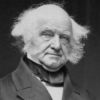Martin Van Buren

Martin Van Buren
Martin Van Buren; December 5, 1782 – July 24, 1862) was an American politician who served as the eighth President of the United States. A member of the Democratic Party, he served in a number of senior roles, including eighth Vice Presidentand tenth Secretary of State, both under Andrew Jackson. Van Buren's inability as president to deal with the deep economic depression following the Panic of 1837 and with the surging Whig Party led to his defeat in the 1840...
NationalityAmerican
ProfessionUS President
Date of Birth5 December 1782
CityKinderhook, NY
CountryUnited States of America
Is it possible to be anything in this country without being a politician?
To avoid the necessity of a permanent debt and its inevitable consequences, I have advocated and endeavored to carry into effect the policy of confining the appropriations for the public service to such objects only as are clearly with the constitutional authority of the Federal Government.
The national will is the supreme law of the Republic, and on all subjects within the limits of his constitutional powers should be faithfully obeyed by the public servant.
No evil can result from its [slavery's] inhibition more pernicious than its toleration.
In a government whose distinguishing characteristic should be a diffusion and equalization of its benefits and burdens the advantage of individuals will be augmented at the expense of the community at large.
I shall tread in the footsteps of my illustrious predecessor.
There is a power in public opinion in this country - and I thank God for it: for it is the most honest and best of all powers - which will not tolerate an incompetent or unworthy man to hold in his weak or wicked hands the lives and fortunes of his fellow-citizens.
As to the presidency, the two happiest days of my life were those of my entrance upon the office and my surrender of it.
In time of peace there can, at all events, be no justification for the creation of a permanent debt by the Federal Government. Its limited range of constitutional duties may certainly under such circumstances be performed without such a resort.
Railroad carriages are pulled at the enormous speed of fifteen miles per hour by engines which, in addition to endangering life and limb of passengers, roar and snort their way through the countryside, setting fire to the crops, scaring the livestock, and frightening women and children. The Almighty certainly never intended that people should travel at such break-neck speed.
Most men are not scolded out of their opinion.
The less government interferes with private pursuits, the better for general prosperity.
There is but one reliance.
The government should not be guided by Temporary Excitement, but by Sober Second Thought.